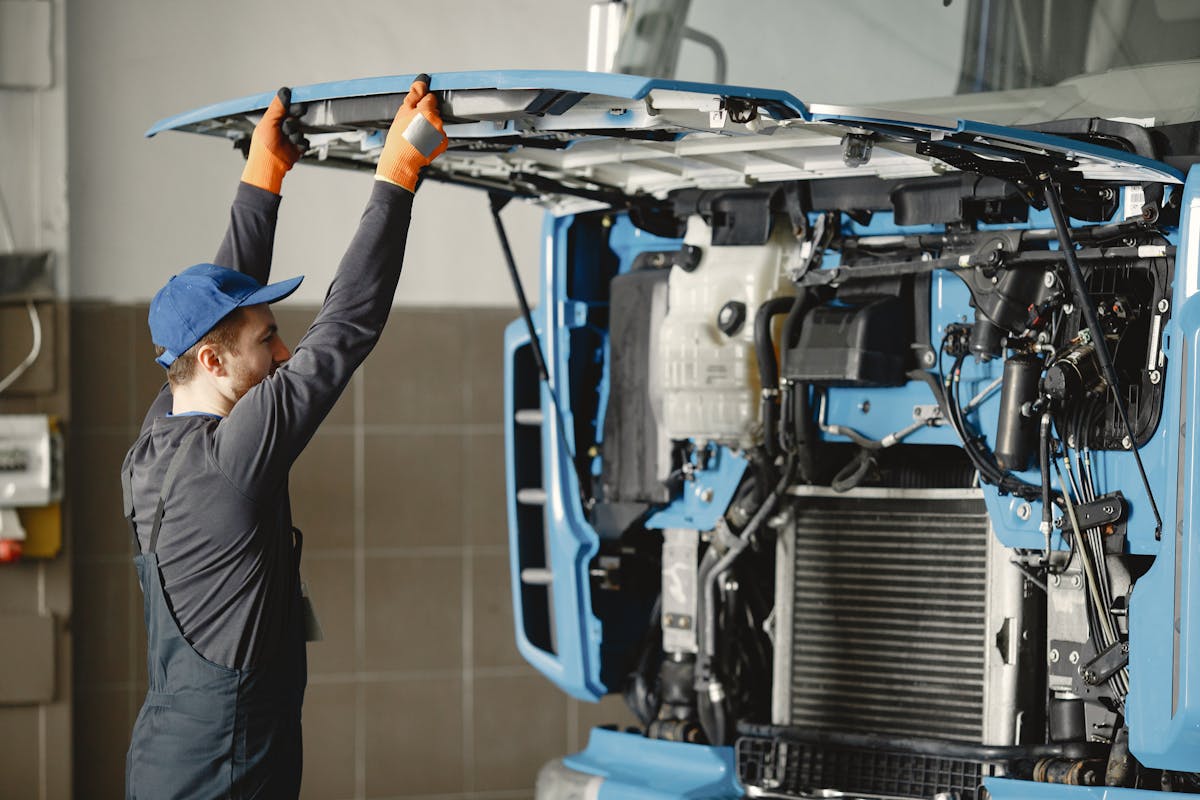How to Spot Early Signs of Radiator Trouble in Diesel Trucks
Your diesel truck will show signs of radiator trouble well before it overheats. Learn what to watch for, listen for, and even smell before your rig crawls to a stop!

It’s a crisp morning, you’ve got a load to deliver, and your rig’s already humming along like a beast. But then, out of nowhere, that temperature gauge starts creeping up, and your stomach drops. Sound familiar?
Many drivers shrug off the little hints their truck gives them before things go sideways. But knowing the signs of radiator trouble in a diesel truck can save you from a nightmare on the shoulder of some lonely highway.
Diesel engines work hard. They generate a lot of heat, and it’s your radiator’s job to keep all that in check. Overheating is one of the most common engine issues out there, and if your cooling system starts to slip, it could overheat faster than you can say “tow truck.”
So, let’s talk about what to watch for, why these little whispers from your truck deserve your full attention, and why timely radiator replacement is critical to protecting your engine and ensuring its long-term performance.
That Creeping Temperature Gauge Isn’t Just Being Dramatic
We all glance at the temp gauge now and then, but do we see it? If yours keeps creeping higher than usual, even on a cool day or while idling, it’s trying to tell you something. Maybe your coolant level is low. Maybe your radiator is partially clogged. Or (and here’s where it gets dicey) maybe there’s a slow leak somewhere you haven’t noticed yet.
And even if it seems manageable at first, an engine running hot for too long can warp your cylinder head, fry your gaskets, and create a repair bill that’ll make you wince. Catching it early could mean the difference between topping off coolant and replacing half your engine.
A well-maintained cooling system protects your engine and helps extend your truck’s lifespan, so keep it in top condition.
Puddles Under Your Truck — It’s Not Just Rainwater
Here’s one of the clearest signs your truck might need coolant system repair, and it could be sitting right under your bumper: If you park overnight and find a puddle of bright green, orange, or pink fluid under the radiator area, don’t assume it’s harmless. Coolant leaks can be slow and sneaky, and they don’t fix themselves.
Sometimes it’s just a cracked hose. Other times, it’s a leaking seam in the radiator itself. Either way, losing coolant means your system can’t keep up with the heat, and your engine pays the price. If you’re already noticing you have to refill coolant more often, even if you don’t see puddles, that’s still a red flag worth investigating.
Steam — Your Truck’s Not Making Coffee
Here’s where people start to panic, and understandably so. If you see steam coming out from under your hood while you’re driving or stopped in traffic, your radiator’s telling you it’s had enough. The coolant is boiling off, which not only leaves your engine unprotected but also signals that something’s failing, right now.
Here’s the kicker: pulling over and shutting down is your best move. Pop the hood (carefully, that steam’s scorching), let it cool, and check levels when it’s safe. Driving “just a little farther” might sound tempting, but it could leave you stranded with serious damage.
Strange Smells — Sweet Isn’t Always Good
If you catch a whiff of something sweet (kind of like syrup) while your engine’s running, that’s usually antifreeze burning off somewhere. Sometimes it’s a slow drip onto hot metal, creating that distinct smell. Other times, it’s leaking onto belts or hoses and being flung around. Either way, your radiator’s integrity is probably compromised.
The problem is, many drivers ignore this because it doesn’t seem urgent. But coolant isn’t supposed to burn or leak at all, and letting it slide can turn a small fix into a massive headache.
Rust And Gunk — A Clogged Radiator’s Calling Card
Radiators aren’t immune to the same grime and corrosion that plagues the rest of your truck. If you pop the cap and notice rusty sludge, brownish water, or chunky sediment, that’s bad news. Not only does this mean your coolant isn’t circulating properly, but that debris could be blocking the fine passages inside the radiator itself.
Sometimes, what looks like rust might just be contaminated coolant. Other times, it’s an internal leak where coolant and oil are mixing. Either way, if what you’re seeing doesn’t look like clean, bright coolant, it’s worth having a shop flush the system and figure out why.
Weird Noises — Yes, Your Truck Talks To You
A radiator problem doesn’t always come with bells and whistles, but sometimes you’ll hear it. Gurgling sounds after shutting off your engine could mean there are air pockets in your cooling system, possibly caused by a leak. Squealing could come from a water pump struggling to circulate coolant because of a blockage or a failing radiator.
This is where knowing your truck pays off. If you’re hearing something out of the ordinary, even if it’s subtle, it’s a clear warning that shouldn’t be ignored. Get it checked out by a trusted repair shop before it leads to serious damage.
What About Performance?
Your truck’s performance depends heavily on how well its engine is maintained, and the cooling system plays a crucial role in that. If your truck starts feeling sluggish, if you notice the A/C not cooling as well (because the condenser sits in front of the radiator and shares airflow), or if your fan seems to run constantly, these could all point back to radiator trouble.
Why? Because when the cooling system is compromised, the engine control unit (ECU) might limit power to prevent damage. You might not see a full-on warning light yet, but that drop in performance can be an early clue.
A Few Habits That Can Save You Big Time
Alright, so now you know the signs of radiator trouble in a diesel truck, but what can you actually do about it? Aside from keeping your coolant levels in check and inspecting hoses regularly, here are a few practical habits that can make a world of difference:
- Always carry extra coolant and water, just in case.
- Replace coolant at recommended intervals (and use the right type, they’re not all the same).
- Have the system pressure-tested once a year.
- Clean the radiator fins gently with compressed air to prevent debris buildup.
- Don’t ignore warning lights, even if the truck seems fine.
You’d be surprised how much life you can get out of your radiator (and your whole engine) just by treating these small issues seriously from the get-go.
Why Catching Radiator Trouble Early Matters
Diesel trucks are built to haul, but they’re not invincible. Heat is one of the quickest ways to shorten the life of an engine. Every mile you drive with a struggling radiator chips away at your truck’s reliability and your wallet.
And while some of these signs seem subtle, they’re really your truck waving a big red flag at you. Paying attention now could save you thousands in repairs, not to mention the downtime that comes with sitting in a shop instead of on the road where you belong.
The Big Takeaway
Radiators don’t usually fail overnight. They whisper before they shout: a puddle here, a smell there, a little rust, a slow gauge climb. If you keep your eyes, ears, and nose open, you can catch these early and avoid catastrophe.
Driving a diesel is like a partnership. Your truck works hard for you, so give it the respect it deserves by noticing when it’s struggling. If you’re serious about keeping your rig running cool and avoiding downtime, pay attention to the early warnings and address them fast.
For expert advice, maintenance, or help diagnosing any of these issues, don’t hesitate to reach out to MPG Truck Solutions. We provide diagnostics and repair for diesel trucks, along with specialized service for RVs, buses, and fleet vehicles. We also help you stay compliant with Clean Truck Check requirements, so your vehicles stay reliable and ready for the road.
Keep Your Cool — Call MPG Truck Solutions
By learning the early signs of radiator trouble in a diesel truck, you’re already ahead of the game. Don’t wait until you’re stuck on the shoulder, steam billowing out, and the clock ticking.
Contact us today to schedule a cooling system inspection or get help with any engine-related issue you’re facing. We’ll help you stay ahead of trouble and keep your rig ready for the long haul!
mORE Articles
Contact Us
Have questions, or want to schedule your truck or trailer in for a service or repair? Get in touch, we're open Monday through Friday from 8:00am to 6:00pm.


.webp)